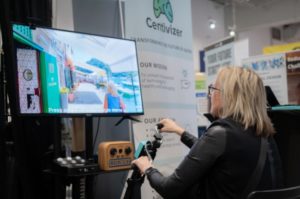
Professor Mark Chignell (MIE) is launching a new pilot project to promote healthy aging for older adults living independently in the community.
With support from the Connaught Community Partnership Research Program, the new activity spaces for community-living older adults will be housed in a communal space in a City Park co-operative apartment building in Toronto.
The room will feature technology designed to stimulate cognitive and physical function and encourage social interaction for older adults who are aging in place — these are individuals who have the social and health support to live safely and independently in their own homes or units.
“A building can be considered a naturally occurring retirement community if more than 30% of occupants are over the age of 65,” says Chignell. “In the case of the City Park co-op, just under 40% of occupants are in this age group.”
Chignell is also working on this initiative with HelpAge Canada, a non-profit that supports community-based senior services; and AGE-WELL, a Canadian network, and University of Toronto Institutional Strategic Initiative, for developing technologies and services for healthy aging.
The activity space will feature products from Centivizer, Chignell’s spinoff company, including 2RaceWithMe, which is currently its most used device and is available in long-term care homes, rehabilitation hospitals and adult day programs across Canada.
The device requires physical and cognitive engagement by having users pedal while watching moving scenic videos — the video only plays when the pedals are being used.
The company has also developed a suite of whack-a-mole-style games for cognitive assessment that Chignell hopes can be used to promote cognitive safety in clinical practice.
“Centivizer is all about building tools to help us age better. My work is motivated by the fact that physical and cognitive health can decline very quickly for older adults,” Chignell says.
“We know the physical body and brain work together, and that physical exercise is important for cognitive status and preventing dementia. So being able to promote more active lifestyles for people who are still living independently in the community can have an immense benefit for our society.”
As the recipient of two previous Connaught Innovation Awards, Chignell feels honoured to receive new support from the Connaught Community Partnership Research Program.
“The Connaught is a great validation as I start this project in naturally occurring retirement communities. I am also continuing to work with retirement homes and long-term care centres, including a new collaboration with a long-term care home in Tokyo, Japan,” he says.
“I’m hoping that this project will demonstrate the value of using our products in the community to help older people retain their physical and cognitive abilities for longer.”
– This story was originally published on the University of Toronto’s Faculty of Applied Science and Engineering News Siteon August 1, 2024, by Safa Jinje.